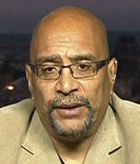(FinalCall.com) - Lee Jasper is one of Great Britain’s leading activists in the Black community. He has spent the last 30 years campaigning for social justice and racial equality. Mr. Jasper’s keen insight and compelling commentary on issues concerning fair treatment and equal justice can be read on http://www.leejasper.com/ and http://leejasper.blogspot.com/. Mr. Jasper recently answered questions posed by Final Call staff writer Starla Muhammad regarding critical issues facing the UK’s Black youth.
Starla Muhammad (Final Call Newspaper): What is the overall condition / status of our Black youth in the UK? Are their major concerns about these “post-code wars?”
The status of most Black youth in the UK is “young, drifting and Black.” Our sons and daughters suffer inordinately high levels of unemployment, locked out of opportunity and locked into a life of poverty and crime by a level of racism that is routinely denied by Government. These Black areas of deprivation are now producing the fourth and fifth generation of children born as third- class citizens in a so-called first-class democracy.
These historically deprived areas have been flooded with drugs and guns, they operate open drug markets. Add to this mix the cultural imperialism of America being forced fed to young people through MTV and a largely White-owned media rap industry that promotes the quintessential ghetto gangster lifestyle and you begin to see why we suffer the terror of “post code” wars. The continued escalation of youth violence in these areas is of serious concern. Post-code wars are created and maintained by post-code discrimination and racism.
FCN: What are the major concerns among young Black Britons today? Are they optimistic or pessimistic about their future? Why?
LJ: Major concerns of Black youth in Britain are the same concerns as all African youth living in Western nations. Concerns over lack of employment, no housing, poor education and police brutality, in particular, Black deaths in custody. Racism in the labour market ensure high rates of Black poverty and as a consequence of the cuts to public sector budgets, we are seeing Black workers being made unemployed and losing their jobs in big numbers.
Over 80 percent of the African and Caribbean community that are in work are employed in the public sector. They were the last in and the first to go. As a result we are seeing Black women and men being made redundant in droves, the consequent effects will be devastating. Poverty breeds crime and in the UK for every 1,000 White people, there are 1.2 people in jail, for Asians that figure is 2.4, for Black people the figure is seven. Put simply, British institutional racism is the most polite and insidious type of racism you will find anywhere in the world.
FCN: As a mentor and community activist, what does the Black community in Britain need to do to reach our young people? What sort of programs and initiatives have you participated in or helped facilitate that seem to work to address the issues of Black youth in Britain?
LJ: We need to develop our own economic base and stop spending money we don’t have to impress people we don’t know. We need to realise the vision that there are over an estimated 25 million Africans in Europe and we need to focus on working with Africans in France and Germany, Netherlands and Belgium, Italy and Spain to bring about a African European wide economic renaissance. If we can link globally with African Americans, South American Africans, those on the African continent, we could reverse engineer the triangular slave trade route and create a global African economy.
People need to understand that history teaches us that African Muslims once ruled Southern Europe. Initiatives we need are our own schools, our own universities and businesses. Our initiatives are focused on getting young people to register to vote through Operation Black Vote, getting young people into business through a campaign called Operation Hope and Recovery, a partnership with the Black churches and ensuring that campaigning skills are taught to our young people.
Having said that, the entire European economic edifice built as it was on great crime and atrocities seems to be reaping the whirlwind of its original sin. The challenge may be now to overthrow capitalism itself as no one community can be inculcated from the acute economic crisis facing Britain. We have to believe that another more compassionate just world is possible.
FCN: Any other comments you would like to share?
LJ: I would like to make what may seem a controversial point here: Celebrity African Americans love London. As actors, sports stars and artists, they come to visit and perform to hundreds and thousands of people, mostly White and earn millions as a result. They tend by and large to leave their commitment to the Black struggle at JFK airport. They rarely engage with the British Black communities and allow themselves to be managed by their White European agents. They ensure that they don’t get involved in the either Black politics or the wider race debate here in the UK. …
Africans throughout the Western world face the biggest challenge since we were stolen from the shores of Africa. We have history that teaches us that when Western economies decline, racism increases and becomes more violent. Now is the time for international African solidarity not just in words but in action. In the age of the internet, ignorance is no defence for inaction.
FCN: Thank you.
 |
